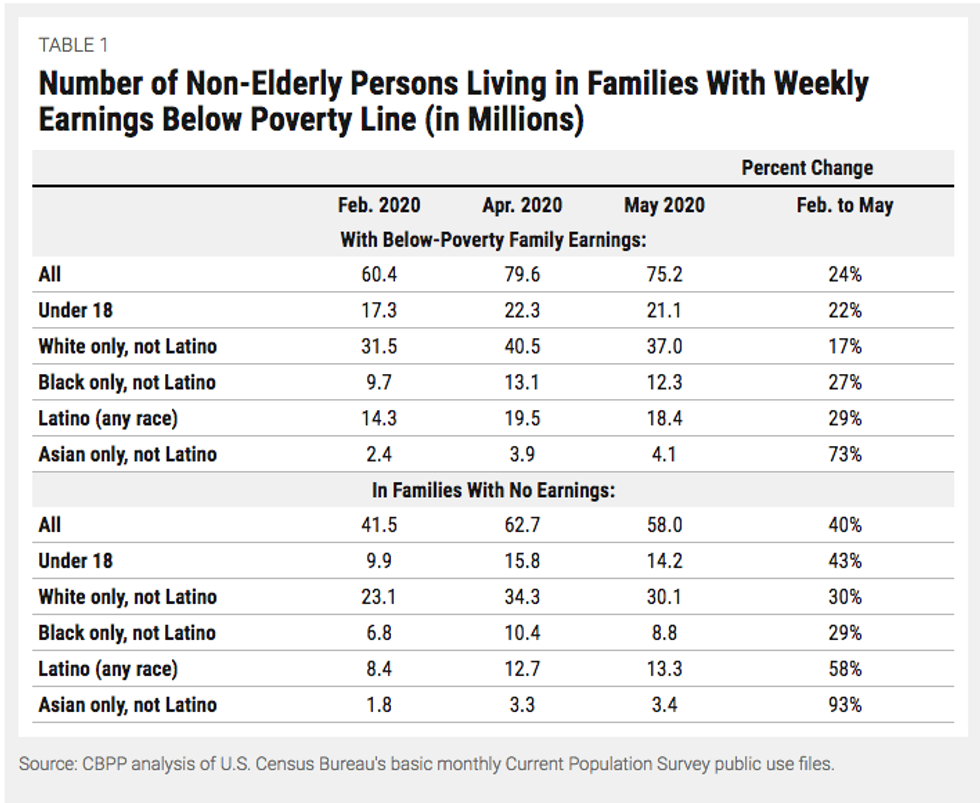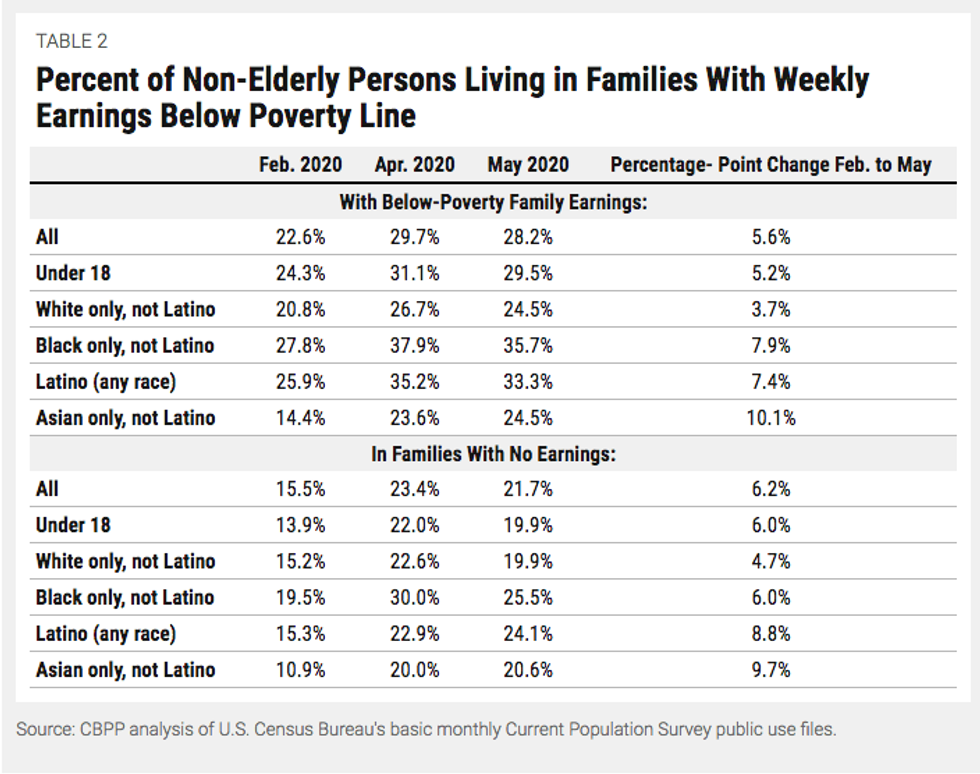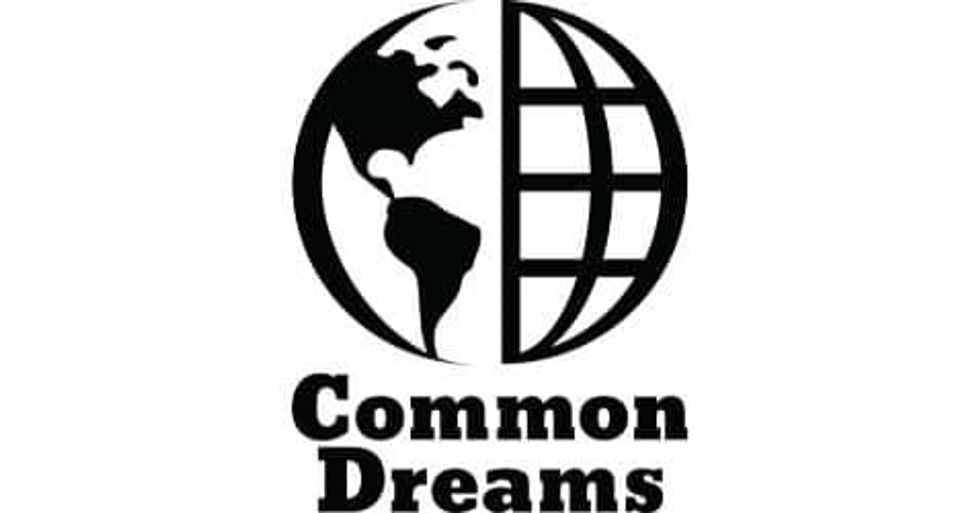June, 16 2020, 12:00am EDT
For Immediate Release
Contact:
Michelle Bazie,202-408-1080,bazie@cbpp.org
Research Note: Number of People in Families With Below-Poverty Earnings Has Soared, Especially Among Black and Latino Individuals
About 75 million non-elderly individuals lived in families with combined weekly earnings below the poverty line in May, CBPP analysis of new Census Bureau data shows -- far above the pre-pandemic (February) level of roughly 60 million, though below the April figure of about 80 million. (See Figure 1 and Table 1.)
WASHINGTON
About 75 million non-elderly individuals lived in families with combined weekly earnings below the poverty line in May, CBPP analysis of new Census Bureau data shows -- far above the pre-pandemic (February) level of roughly 60 million, though below the April figure of about 80 million. (See Figure 1 and Table 1.)
The Bureau of Labor Statistics' official monthly statistics on the record losses in jobs and wages show the pandemic's devastating impact on workers as individuals. But they don't directly show what this means for families' ability to make ends meet. Our new analysis shows the extent to which families have lost earning power and may now need government help in order to meet basic needs. Government assistance is likely keeping many families' total income (including government benefits such as unemployment assistance) above the poverty line.
From February to May 2020:
- The number of non-elderly individuals living in families with combined weekly earnings below the poverty line rose by 14.7 million (24 percent), from 60.4 million to 75.2 million.
- The number of non-elderly individuals with no family earnings rose even more: by 16.5 million (40 percent), from 41.5 million to 58.0 million.
- Among non-elderly Black and Latino individuals, the number with below-poverty family earnings rose by 2.7 million (27 percent) and 4.1 million (29 percent), respectively. Among non-elderly, non-Latino whites, the increase was 5.5 million (17 percent).
- The number of children in families with below-poverty earnings rose by 3.8 million (22 percent), from 17.3 million to 21.1 million.
Between May 2019 and May 2020, the number of non-elderly individuals with below-poverty family earnings rose by close to 13 million.
Many of these families are now receiving help from relief measures, including expanded unemployment and SNAP benefits. But the relief measures enacted to date, including those boosting unemployment benefits and expanding eligibility, are slated to expire in coming months, while the Congressional Budget Office and others project that unemployment will remain high through 2021.
Our analysis also shows that the current recession has hit people of color the hardest. (See Figure 2 and Table 2.) Of special note, Black and Latino workers not only are overrepresented in some of the most-affected industries, but were already at a disadvantage when the recession started due to the nation's long history of inequitable policies and practices in employment, education, and housing. All racial and ethnic groups have experienced sharp earnings losses, but the share of the non-elderly population living with below-poverty earnings started higher and rose more for Black and Latino individualsthan for white individuals. From February to May 2020, the share of non-elderly individuals living with below-poverty family earnings:
- Rose by 7.9 percentage points among Black individuals, from 27.8 percent to 35.7 percent;
- Rose by 7.4 percentage points among Latino individuals, from 25.9 percent to 33.3 percent;
- Rose by 3.7 percentage points among non-Latino white individuals, from 20.8 percent to 24.5 percent.
Among non-elderly Asian individuals, the share living in weekly earnings poverty started lower than for non-elderly, non-Latino white individuals but rose more, by 10.1 percentage points from February to May.
Comparing over the last 12 months to avoid any seasonal influence also shows a large increase in poverty for the overall population. Between May 2019 and May 2020, the share of non-elderly individuals with below-poverty family earnings rose by 4.9 percentage points.
Of those with below-poverty earnings prior to the crisis, some had earnings but earned less than the poverty line; others were between jobs and looking for work or were out of work for other reasons, such illness, school, or early retirement.
Methodology
These figures are from our analysis of the outgoing rotation groups (ORG) of the Census Bureau's monthly Current Population Survey (CPS). The ORG, which makes up just under one-fourth of the CPS monthly sample, includes questions about individuals' usual weekly earnings. Using those data, and annual thresholds for the official poverty measure divided by 52 weeks (and adjusted for monthly inflation by the official Consumer Price Index for all urban consumers), we calculated the number of individuals in families with earnings below the weekly poverty line.[1] (We counted a two-adult two-child family poor in February 2020 if its weekly earnings were below $504; the weekly threshold in May was $500.) The May 2020 survey covered earnings in the week beginning May 10.
The estimates are less precise than the Census Bureau's official annual poverty figures, in part because the ORG sample is relatively small (about 12,300 households in February) and participation in the survey declined non-randomly in the pandemic (to about 11,600 in May). The smallest group shown here -- non-elderly Asian individuals -- is based on a sample size of 513 households in the May 2020 survey.[2]


The Center on Budget and Policy Priorities is one of the nation's premier policy organizations working at the federal and state levels on fiscal policy and public programs that affect low- and moderate-income families and individuals.
LATEST NEWS
Slotkin Panned Online After Claiming That Voters Don't Know What 'Oligarchy' Means
"It's condescending to say that the median person doesn't understand what oligarchy is," said one progressive strategist. "They're living it."
Apr 25, 2025
U.S. Sen. Bernie Sanders' tour headlined with this word has drawn more than 107,000 Americans in blue and deep-red states alike. Former President Joe Biden's use of it in his farewell speech prompted a spike in Google searches. And one recent poll found that a majority of U.S. voters, including 54% of Democrats and more than two-thirds of Independents, know exactly what it means.
Yet Sen. Elissa Slotkin (D-Mich.) was among the Democratic politicians insisting this week that no one does.
The word is "oligarchy"—a government ruled by a small group of elites—and as experts have warned for years, the U.S. increasingly resembles one. As Sanders (I-Vt.) and Rep. Alexandria Ocasio-Cortez (D-N.Y.) have told huge crowds in places like Nampa, Idaho and Greeley, Colorado in recent weeks, President Donald Trump's alliance with billionaire tech mogul Elon Musk has made the country's shift even more obvious.
But even as evidence mounts that Americans understand that the political system has been captured by corporations and the wealthiest people—and are living their day-to-day lives with the results, including higher healthcare costs and disinvestment in public services—Slotkin toldPolitico on Thursday that Democrats should "stop using the term 'oligarchy,' a phrase she said doesn't resonate beyond coastal institutions."
On Bluesky, The Nation writer John Nichols said that the tens of thousands people who have packed stadiums and parks in recent weeks to hear Sanders and Ocasio-Cortez speak would disagree with Slotkin.
Michigan Senator Elissa Slotkin says Democrats should stop using the term "oligarchy" because, she says, no one knows what it means. These people say she’s wrong.
[image or embed]
— John Nichols (@nicholsuprising.bsky.social) April 24, 2025 at 8:00 PM
Slotkin's advice for Democrats, which she dubbed her "war plan" and gave ahead of several speeches she has planned, also included a call for the party to stop being "weak and woke," phrases she said she heard in Michigan focus groups.
Her comments echoed those of former Chicago Mayor Rahm Emanuel, a longtime Democratic operative who told California Gov. Gavin Newsom on his podcast last week that using terms like "oligarchs" and "special interests" makes Democrats "worse marketers"; Newsom appeared to agree that people don't "understand" what an oligarchy is.
Emanuel also appeared on the political and pop culture podcast "I've Had It," hosted by Jennifer Welch and Angie Sullivan, and seemed caught of guard when Welch took him to task for his suggestion that Democrats should end their advocacy for issues that affect transgender Americans.
"That is total bullshit, that is buying into the right-wing media narrative, and I'm so sick of Democrats like you selling out and saying this," said Welch. "You know who talks about trans people more than anybody? MAGA... We've got to fucking fight. They're the gender-obsessed weirdos, not us. We're the ones who fight for Social Security, we fight for Medicare, and yeah, we're not gonna bully trans people."
Semafor political reporter Dave Weigel said Emanuel's derision of the word "oligarchy" is a clear "shot at Sanders/AOC, who keep saying it."
At one stop on the Fighting Oligarchy Tour recently, Sanders told a crowd that the enthusiasm for his and Ocasio-Cortez's message is "scaring the hell out of" Trump and Musk.
But shortly after Slotkin's comments, Ocasio-Cortez remarked—without naming the senator—that "plenty of politicians on both sides of the aisle feel threatened by rising class consciousness."
Angelo Greco, a progressive strategist who works with grassroots organizations including Our Revolution and One Fair Wage, told Common Dreams on Friday that establishment Democrats' dismissal of the term oligarchy is "out of touch" and "underestimates" voters.
"Tell me that farmers don't understand what the oligarchy is when there's a consolidation of the agribusiness that impacts them. Tell me that workers in Michigan don't understand what it means when trade deals that are written by multinational corporations have led to lower wages and plant closures," said Greco. "It's condescending to say that the median person doesn't understand what oligarchy is. They're living it."
Keep ReadingShow Less
'Fascism Getting Turned Up' as Trump FBI Arrests Wisconsin County Judge
"This isn't justice," said one observer. "It's a warning shot: Obey, or get cuffed."
Apr 25, 2025
This is a breaking story... Please check back for possible updates...
Federal agents arrested a sitting Wisconsin judge on Friday, accusing her of helping an undocumented immigrant evade arrest after he appeared in her courtroom last week, FBI Director Kash Patel said on social media.
In a since-deleted post, Patel said the FBI arrested 65-year-old Milwaukee County Circuit Judge Hannah Dugan "on charges of obstruction."
"We believe Judge Dugan intentionally misdirected federal agents away from the subject to be arrested in her courthouse... allowing the subject—an illegal alien—to evade arrest," Patel wrote. "Thankfully, our agents chased down the perp on foot and he's been in custody since, but the judge's obstruction created increased danger to the public."
FBI arrests judge in escalation of Trump immigration enforcement effort Federal agents arrested Milwaukee Circuit Court Judge Hannah Dugan on obstruction charges. Dugan is accused of “helping” an immigrant evade arrest. The fascism getting turned up!
[image or embed]
— RootsAction (@rootsaction.org) April 25, 2025 at 8:05 AM
It is unclear why Patel deleted the post. U.S. Marshals Service spokesperson Brady McCarron and multiple Milwaukee County judges confirmed Dugan's arrest, according to the Milwaukee Journal Sentinel. McCarron said Dugan is facing two federal felony counts: obstruction and concealing an individual.
The Journal Sentinel reported that Dugan "appeared before U.S. Magistrate Judge Stephen C. Dries during a brief hearing in a packed courtroom at the federal courthouse" and "made no public comments during the brief hearing."
Dugan's attorney, Craig Mastantuono, told the court that "Judge Dugan wholeheartedly regrets and protests her arrest," which "was not made in the interest of public safety."
Prominent Milwaukee defense attorney and former federal prosecutor Franklyn Gimbel called Dugan's arrest "very, very outrageous."
"First and foremost, I know—as a former federal prosecutor and as a defense lawyer for decades—that a person who is a judge, who has a residence who has no problem being found, should not be arrested, if you will, like some common criminal," Gimbel told the Journal Sentinel. "And I'm shocked and surprised that the U.S. Attorney's office or the FBI would not have invited her to show up and accept process if they're going to charge her with a crime."
Responding to Dugan's arrest, liberal podcaster Brian Allen wrote on social media: "This isn't justice. It's a warning shot: Obey, or get cuffed."
Keep ReadingShow Less
ICE Admits They Didn't Have a Warrant When They Arrested Mahmoud Khalil
"ICE has admitted it detained Mahmoud illegally and without a warrant—to justify it, they are now flat out lying with an absurd claim that he tried to flee," said a staff attorney at the Center for Constitutional Rights.
Apr 25, 2025
U.S. Immigration and Customs Enforcement agents did not have a warrant when they arrested Palestinian activist and green-card holder Mahmoud Khalil on March 8, according to court papers filed by the Department of Homeland Security on Thursday—an admission that elicited outrage from members of Khalil's legal team.
Marc Van Der Hout, an attorney representing Khalil, said Thursday that "DHS agents who arrested Mahmoud lied to him: They wrote in their arrest report that the agents told him that they had an arrest warrant, but DHS has now admitted in their filing that that was a lie and that there was no warrant at all at the time of the arrest."
"The government's admission is astounding," added Van Der Hout.
Officers with DHS served Khalil with a warrant after his arrest when he arrived at an ICE facility in New York for processing, according to court filings. In the filing, an attorney for DHS argued that "an exception to the warrant requirement exists where the immigration officer has reason to believe that the individual is likely to escape before a warrant can be obtained."
According to the government, immigration agents did not need a warrant to arrest Khalil because his conduct gave them reason to believe it was likely he would flee. The government also alleged that Khalil "refused to cooperate" with immigration agents arresting him—an account that Khalil's supporters say contradicts a video of his arrest that was taken by his wife, Noor Abdalla.
"ICE has admitted it detained Mahmoud illegally and without a warrant—to justify it, they are now flat out lying with an absurd claim that he tried to flee. At every step of the way, the Trump administration has flouted the law," said Samah Sisay, a staff attorney at the Center for Constitutional Rights.
Another attorney for Khalil, Amy Greer, said she was on the phone with Khalil, his wife, and even spoke to the agent making the arrest on March 8.
"In the face of multiple agents in plain clothes who clearly intended to abduct him, and despite the fact that those agents repeatedly failed to show us a warrant, Mahmoud remained calm and complied with their orders," she said Thursday. "Today we now know why they never showed Mahmoud that warrant—they didn't have one."
According to CNN, these latest documents were filed to fulfill a request from the New Jersey federal district court judge overseeing Khalil's federal case, who directed Khalil's legal team and attorneys at the Department of Justice to submit all filings that were presented in his immigration case in Louisiana, where he is currently being held at an ICE detention center.
In federal court, Khalil's attorneys are challenging the legality of his detention and have sought his release on bail.
Khalil, who completed work on his masters degree from Columbia University in December, was active in pro-Palestine organizing on the school's campus last year. Another Palestinian green-card holder active in Columbia's student protest movement, Mohsen Mahdawai, was also recently arrested by federal immigration agents.
Abdalla was eight months pregnant when Khalil was detained. ICE denied Kahlil's request for a temporary furlough to be with his wife while she gave birth on April 21.
Keep ReadingShow Less
Most Popular



